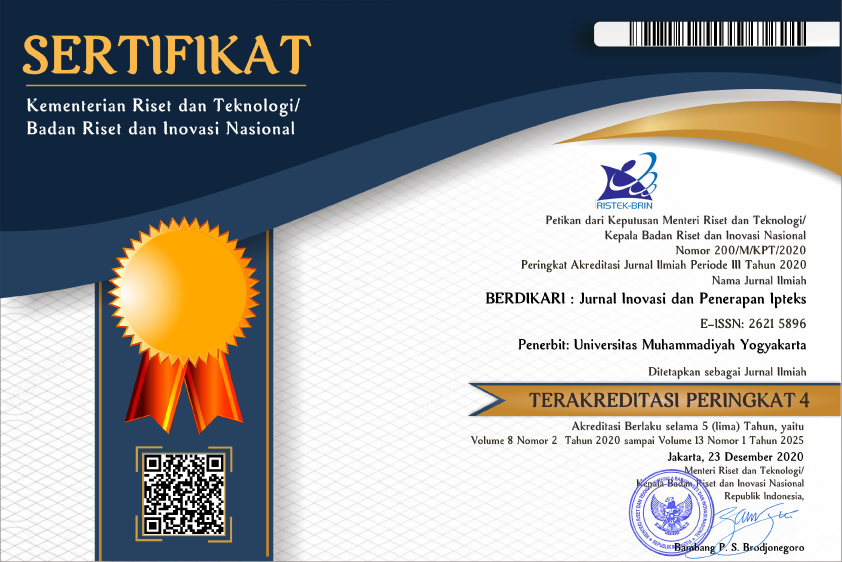Daya Saing Usaha Mikro Melalui Sertifkasi Produk Industri Rumah Tangga
DOI:
https://doi.org/10.18196/berdikari.v11i2.17354Keywords:
tourism, culinary, MSMEs, SPP-IRTAbstract
Culinary is an important aspect of developing tourism destinations. Micro, Small, and Medium Enterprises (MSMEs) are the support for food supply that are required to fulfill requirements to ensure consumer food safety by having a Home Industry Food Production Certificate (SPP-IRT). Efforts to fulfill product quality improvements can further increase the competitiveness of micro-business actors. The provisions or requirements for obtaining this permit often make it difficult for MSME players. This program aims to train and assist food MSMEs in obtaining SPP-IRT. The approach used is focus group discussions (FGD), tutorials, nutritional composition testing, and direct assistance in filling out the official IRT permit registration application issued by the government. The activity results showed that 56 food MSMEs who took part in the FGD had received training on good manufacturing practices, processing methods for processed products, and P-IRT ownership. Twelve MSME products already have documents on nutritional content and nutritional adequacy figures, and 13 MSMEs have succeeded in obtaining Home Industry Licensing Certificates, while the rest are still in the form of Business Identification Numbers (NIB), which is the identity that business actors need to have. The nutritional content and P-IRT number can be included on the packaging to gain consumer trust.
References
BPOM, 2020, Pedoman Label Pangan Olahan, Jakarta
Bandy L, Adhikari V, Jebb S, Rayner M (2019) The use of commercial food purchase data for public health nutrition research: A systematic review. PLoS ONE 14(1): e0210192. https://doi. org/10.1371/ journal.pone.0210192
Basnet, 2018. Focus Group Discussion: A Tool For Qualitative Inquiry, Journal of Culture and Society, October 2018 DOI: 10.3126/researcher.v3i3.2155
Ellisa, A., Eerang, P., Sangkyun, K., Ian, Y. (2018). What is food tourism?. Tourism Management, 68, 250-263
Hutabarat, L. R. F. W. (2015). Strategi Pengembangan Usaha Kuliner di Kota Malang Berbasis Ekonomi Kreatif. Jurnal Ekonomi Dan Studi Pembangunan, 7(1), 12–20.
Kusumawati1 D. N. I, Kusumah W I, R. Widyo Wibisono.T, 2022, Analisis Desain Kemasan Produk UMKM Makanan Tradisional Lemper Berbahan Alami Memiliki Daya Tarik Dan Ketahanan Mutu Produk, Jurnal Nawala Visual | ISSN 2684-9798 | E-ISSN 2684-9801, Vol.4 No.1-Mei 2022
Lestari T. R P A, 2020, Penyelenggaraan Keamanan Pangan sebagai Salah Satu Upaya Perlindungan Hak Masyarakat sebagai Konsumen: Jurnal Masalah-Masalah Sosial | Volume 11, No. 1 Juni 2020 ISSN: 2086-6305 (print) ISSN: 2614-5863 (electronic) doi: 10.22212/aspirasi.v11i1.1523. http://jurnal.dpr.go.id/index.php/aspirasi /index
Lin, Y.-C., Pearson, T. E., & Cai, L. A. (2010). Food as a form of destination identity: A tourism destination brand perspective. Tourism and Hospitality Research, 11(1), 30– 48. http://doi.org/10.1057/thr.2010.22
Nathalie K, Mariana V. S. Kraemer, Tailane S, Vanessa M. Rodrigues, Ana C.F , Greyce L.B., Paula L. U. dan Rossana P. C. P., 2018, Review: Serving Size and Nutrition Labelling: Implications for Nutrition Information and Nutrition Claims on Packaged Foods, Nutrients 10, 891; doi:10.3390/nu10070891
Pujilestari S, Amelia J R, 2021. Karakteristik Wisatawan Dan Perilaku Keamanan Pangan Di Kawasan Kota Tua Dki Jakarta, Jurnal Industri Pariwisata, Vol 4, No 1
Purnomo, A. M. (2021). Development of Local Food in Tourism for Supporting Sustainable Indonesia Tourism Development. 104–109. https://doi.org/10.5220/0010003301040109
Pedoman Implementasi Peraturan Badan POM no 20 Tahun 2019 tentang Kemasan Pangan.
Peraturan BPOM no 22 Tahun 2019 tentang Informasi Gizi pada Label Pangan Olahan
Peraturan Badan Pengawas Obat Dan Makanan Nomor 22 Tahun 2018 Tentang Pedoman Pemberian Sertifikat Produksi Pangan Industri Rumah Tangga.
Pangestuti, V. A. M. K. M. E. (2016). KULINER ( Studi Pada Ukm Berbasis Kuliner Kota Malang ). Administrasi Bisnis, 38(2), 105–111
Suryani D, Mudayana A A, Khakim M, 2021, Pelatihan Keamanan Pangan Di Kawasan Wisata Wilayah Kelurahan Srimartani Piyungan, Bantul, SALAPARANG, Jurnal Pengabdian Masyarakat Berkemajuan, Volume 5, Nomor 1
Saptaningtyas, R. S., Handayani, T., & Mentari Indriani, N. K. A. I. P. (2021). Kajian Potensi Wisata Kuliner Pantai Ampenan. SADE : Jurnal Arsitektur, Planologi Dan Teknik Sipil, 1(1), 14–19. https://doi.org/10.29303/sade.v1i1.6
Downloads
Published
Issue
Section
License
Copyright
Authors retain copyright and grant BERDIKARI Jurnal Inovasi dan Penerapan IPTEK the right of first publication with the work simultaneously licensed under an Attribution 4.0 International (CC BY 4.0) that allows others to remix, adapt and build upon the work with an acknowledgment of the work's authorship and of the initial publication in BERDIKARI Jurnal Inovasi dan Penerapan IPTEK.
Authors are permitted to copy and redistribute the journal's published version of the work (e.g., post it to an institutional repository or publish it in a book), with an acknowledgment of its initial publication in BERDIKARI Jurnal Inovasi dan Penerapan IPTEK
License
Articles published in the BERDIKARI Jurnal Inovasi dan Penerapan IPTEK) are licensed under an Attribution 4.0 International (CC BY 4.0) license. You are free to:
- Share — copy and redistribute the material in any medium or format.
- Adapt — remix, transform, and build upon the material for any purpose, even commercially.
This license is acceptable for Free Cultural Works. The licensor cannot revoke these freedoms as long as you follow the license terms. Under the following terms:
- Attribution — You must give appropriate credit, provide a link to the license, and indicate if changes were made. You may do so in any reasonable manner, but not in any way that suggests the licensor endorses you or your use.
- No additional restrictions — You may not apply legal terms or technological measures that legally restrict others from doing anything the license permits.




